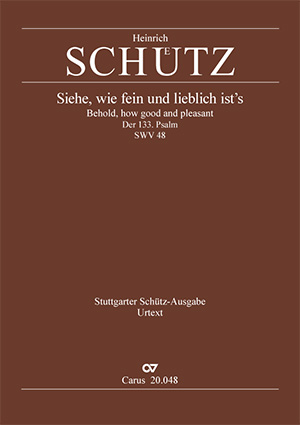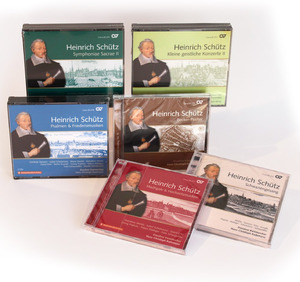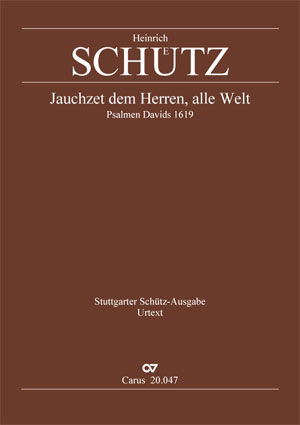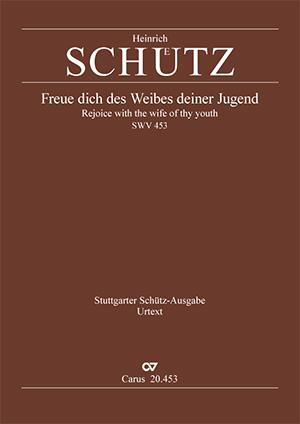Heinrich Schütz’s setting of Psalm 133 was composed for the wedding of his “amiable and much-loved” brother Georg Schütz which took place on 9 August 1619 in St Nicholas’s Church in Leipzig. With its colorful instrumental accompaniment, this intimate composition may be regarded as one of the most charming works of its time. At the same time it is probably the first work by Schütz which gives us a sense of the concertante style of the Symphoniae sacrae I which were to follow.
Acheter
Informations complémentaires sur l'œuvre
-
Compositeur
Heinrich Schütz
| 1585-1672Heinrich Schütz is regarded as the first German musician of European stature. As a choirboy from 1599 at the court of Landgrave Moritz of Hessen-Kassel, he received a thorough education. In 1608 he began a law degree in Marburg, but broke this off in 1609 in order, with the support of the Landgrave, to study composition with Giovanni Gabrieli, organist at St Mark’s in Venice. In 1613 Schütz returned to Kassel, but two years later was enticed away by Elector Johann Georg I of Saxony to the Dresden court as “Organist und Director der Musica”, where he held the position of Hofkapellmeister (court Kapellmeister) from 1617 until his death. Schütz’s great cycles of vocal works marked the high point of his reputation in Germany and northern Europe. But these represent only part of Schütz’s output; individual works are represented in printed collections with works by other composers, others only survive in manuscript, and much has been lost. The Stuttgart Schütz Edition makes available Schütz’s complete oeuvre, and all works are also published in practical Urtext editions. Plus d'information sur la personne
-
Éditeur
Uwe Wolf
| 1961Uwe Wolf studied musicology, history, and historical ancillary science at Tübingen and Göttingen. After receiving his doctorate in 1991 he was a research assistant at the Johann-Sebastian-Bach-Institut in Göttingen. From 2004 he worked at the Bach-Archiv Leipzig. There he directed a both research departments, was substantially responsible for the redisigning of the Bach Museum, and he developed the digital Online-Projekt Bach. Since October 2011 he has been the Chief Editor at Carus-Verlag, Stuttgart. He has taught at various universities and also belongs to the editorial boards of several complete editions. Plus d'information sur la personne
-
Basse continue réalisée
Daniel Ivo de Oliveira
| 1979
Questions fréquentes sur l'œuvre
 Il n'y a pas encore de questions et réponses concernant cette œuvre ou vous n'avez pas trouvé la réponse à votre question sur l'œuvre ? Cliquez ici et envoyez votre question spécifique à notre service clients.
Il n'y a pas encore de questions et réponses concernant cette œuvre ou vous n'avez pas trouvé la réponse à votre question sur l'œuvre ? Cliquez ici et envoyez votre question spécifique à notre service clients.









